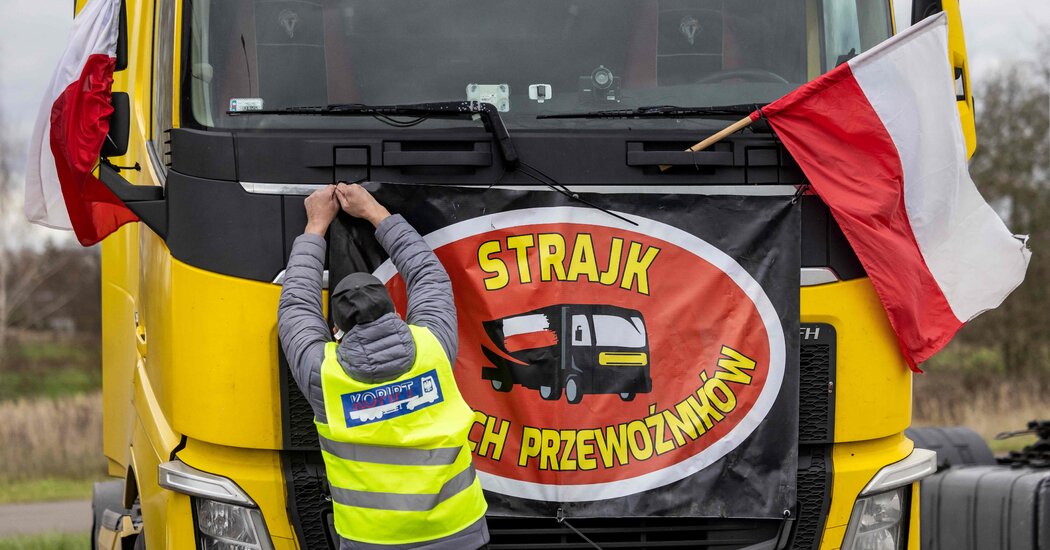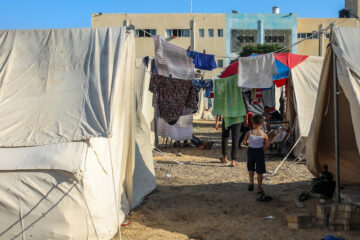[ad_1]
Thousands of trucks were lined up at several border crossings between Ukraine and Poland on Friday, preventing goods from being delivered to Europe and causing traffic jams lasting several days as Polish truckers blocked checkpoints over what they said was unfair competition from their Ukrainian counterparts.
Ukraine’s infrastructure minister, Oleksandr Kubrakov, said in a statement on Thursday afternoon that more than 20,000 vehicles were blocked on both sides of the border, adding that the protest was already affecting the economies of Ukraine and the European Union.
The figure could not be independently confirmed — a statement from Ukraine’s state border service on Thursday said the number of trucks prevented from crossing into Ukraine was 1,700 — but there was little dispute that the disruption has been significant.
The waiting time for drivers at two of the three checkpoints that protesters have been blocking was as long as seven days as of Friday afternoon, the fifth day of the protests, according to the Polish authorities.
“Korczowa, Hrebenne, Dorohusk — commercial traffic is at a standstill,” read a message posted on the Facebook page of the Polish Committee for the Defense of Carriers and Transport Employers on Monday, the first day of the protest, in a reference to the three crossing points that have been blocked.
Poland has been one of Kyiv’s strongest wartime backers, but there have been broader tensions over Ukrainian exports transiting through Poland as Kyiv desperately tries to find alternative export routes to evade Russia’s de facto blockade of the Black Sea, Ukraine’s main trading route before the war.
This fall, Polish farmers protested over what they said was cheap Ukrainian produce seeping into the country’s domestic markets and hurting their businesses, prompting Poland to ban agricultural imports from Ukraine.
Now, the Polish truckers claim that the European Union’s decision to scrap permits for Ukrainian truckers after Russia’s full-scale invasion last year — a decision designed to help keep the Ukrainian economy afloat during the war — has led to an influx of Ukrainian drivers, cutting into their profits.
“Their trucks flooded us,” Jacek Sokol, from the Polish Committee for the Defense of Carriers and Transport Employers, told Polish news outlets.
The protesters’ main demands are the restoration of transport permits for Ukrainian truckers, a move that would effectively limit the number of drivers from outside the bloc who could operate there, and a ban on transportation companies from outside the European Union.
As of midday on Friday, the waiting time was 50 hours at the Dorohusk checkpoint and 172 hours at Hrebenne, according to data from the Polish National Revenue Administration.
The Ukrainian authorities said they were in contact with their Polish counterparts to resolve the issue. But Serhii Derkach, a deputy of Mr. Kubrakov, the infrastructure minister, seemed to indicate that Ukraine would not compromise on the reintroduction of permits.
“For us, it is unacceptable in the conditions of war,” he wrote on Facebook this week, citing the effect of the conflict on Ukraine’s logistic chains and the suffering caused by Russia’s obstruction of the Black Sea.
The bans angered Ukraine, which filed a complaint with the World Trade Organization against the three countries. It suspended its complaint early last month after reaching an agreement with Slovakia to issue licenses to exporters to regulate the flow of grain and finding common ground with Poland over the transport of certain agricultural exports to third countries.
Poland is poised to form a new government after recent elections, and the protests may be a move by the truckers to secure concessions as negotiations take place over who will lead the country.
Anatol Magdziarz contributed research from Warsaw, Poland, and Daria Mitiuk from Kyiv.
[ad_2]
Source link




